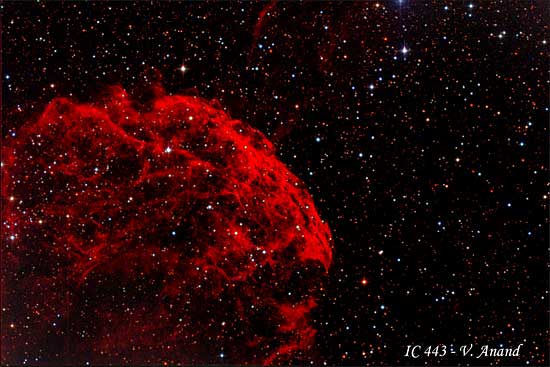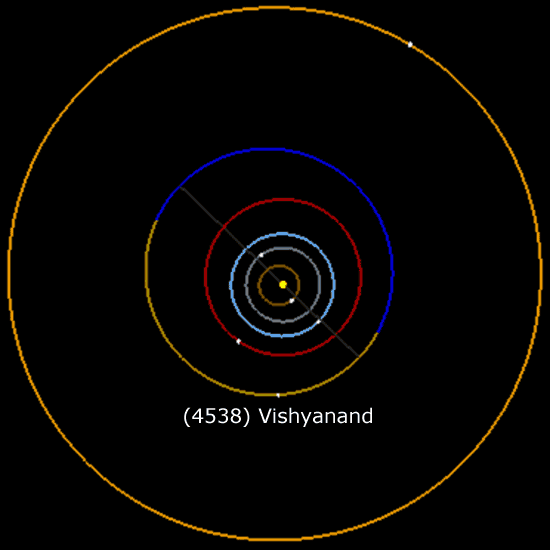(4538) Vishyanand – Minor planet named after chess player
In addition to the eight planets (in 2006 Pluto had its classification
changed from planet to "dwarf planet"), there are likely many
millions of small bodies which are members of the Solar System. These include
approximately 650,000 minor planets, formerly referred to as asteroids,
and 3800 comets currently known. On average a new minor planet is discovered
every five to ten minutes, and a new comet every week or so. Once a sufficiently
accurate orbit is determined for a minor planet, it is assigned a number.
It is also then subject to being named. The first minor planet, discovered
in 1801 is known as "(1) Ceres".
The privilege of suggesting a name for a minor planet is accorded to the
discoverer. An international committee of astronomers – members of
a working group of the International Astronomical
Union – have the final authority to officially assign a name to
a minor planet. The discoverer has this exclusive privilege for ten years
following an object being numbered, after which the committee members themselves
may elect to assign a name. They occasionally invite select people to submit
names for minor planets for which the ten year exclusivity period has expired.
Names are subject to certain
rules laid down by the committee.
The Minor Planet Center,
which operates at the Smithsonian Astrophysical Observatory, is an organization
tasked with being the repository of all observations of minor planets and
comets, and computing orbits for them. MPC is responsible for the identification,
designation and orbit computation for all of these objects. Recently staff
member Michael Rudenko was invited to suggest a name for minor planet (4538),
discovered back in 1988 and still unnamed. Rudenko, who received an SB in
Mathematics from MIT in 1977, has worked at the MPC since 2009 as an IT
Specialist engaged in modernizing the MPC observation processing, orbit
computation and related operations. During the 1980s he undertook a visual
comet hunting project and discovered three comets with the aid of a six-inch
refractor.
"My two passions in life are astronomy and chess," says Mike,
who has a Playchess account. "I thought it might be appropriate to
name a minor planet in honor of a chess grandmaster. My thoughts at once
turned to Viswanathan Anand who, in addition to being the fifteenth world
chess champion, is
also an astronomy buff."

Viswanathan Anand enjoys using the Itelescope
facility, with occasional advice from Dr
Christian Sasse. In 2013 Vishy targeted the Lagoon Nebula (M8), which
is about 5000 light years from earth with a size of 110 by 50 light years.
He used the 20 inch telescope (T31 from ITelescope) in Australia to image
this nebula. The result is remarkable and shows the object in unique detail.
The total exposure time was 100 min.

Anand also captured the above image of IC 443,
also known as the Jellyfish Nebula,
a Galactic supernova remnant
in the constellation Gemini, roughly 5,000
light years from Earth.
Michael Rudenko proposed the name "Vishyanand" (adhering to rules
requiring names to be 16 characters or fewer, and preferably without spaces),
along with a brief citation explaining the reason for the name. To his delight,
the committee gave its approval, and minor planet (4538) is now officially
known as "(4538) Vishyanand". The citation reads: "Viswanathan
(Vishy) Anand (b. 1969) was India's first chess grandmaster. He went on
to become the fifteenth undisputed world chess champion. In addition to
his passion for chess, he is also an avid astrophotography enthusiast."
Osculating elements from astorb-database for 4538 Vishyanand
| Number |
Name or designation |
Mean Anomaly M |
Long. of Perihelion Argument w |
Long. of Perihelion L |
Long. of Ascending Node o |
Inclination i |
| 4538 |
Vishyanand |
4.27439° |
162.93917° |
22.27148° |
219.33231° |
3.948644° |

Orbit diagram of (4538) Vishyanand, with the
orbits of the planets Mercury through Jupiter
| Eccentricity e |
Semi major axis a |
Perihelion distance |
Aphelion distance |
Period (years) |
Epoch (date) |
observations |
diameter |
| 0.1530474 |
2.4242945 AU |
2.053262 AU |
2.795326 AU |
3.774661 |
20150319 |
112 |
N.A. |
Discovery data for 4538 Vishyanand
| Number |
Name |
Designation |
Date of discovery |
Site of discovery |
Discoverer(s) |
| 4538 |
|
1988 TP |
1988 10 10 |
Toyota |
Suzuki, K. |


























